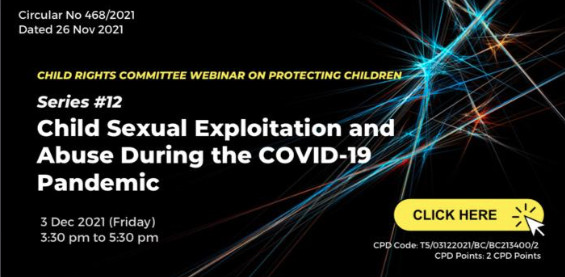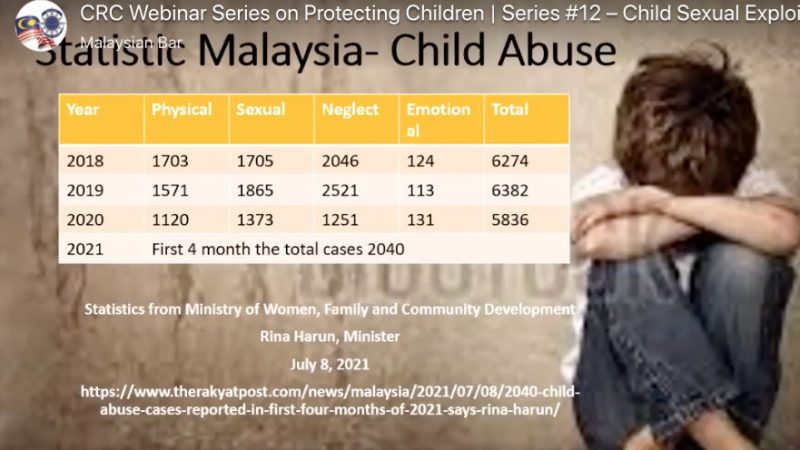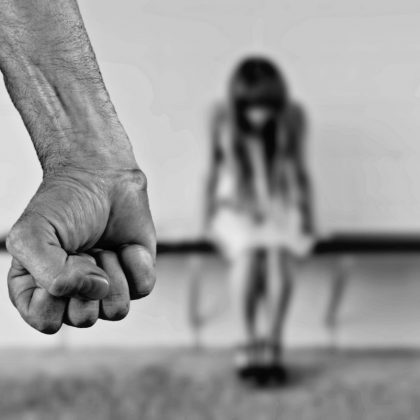15 Dec Webinar: Child Sexual Exploitation and Abuse during the Pandemic
Child Sexual Exploitation and Abuse during the COVID-19 Pandemic
Organised by the Malaysian Bar Council on December 3, 2021

Panellists Mohan Dallumal, Senior Lecturer, Dika College and
Dr James Nayagam, Child Rights Activist shared their experience in the area of
child abuse, neglect and sexual exploitation, and emphasised why they see the
solution to the problem must come from the education and empowerment of the vulnerable.
Laws
In 1874 New York, ten-year-old Mary Ellen was repeatedly abused, neglected and tortured by her foster parents. When she was finally rescued by her neighbours, there were no laws then to charge Francis and Mary Connolly with. Eventually, statutes against cruelty to animals were used to remove her from their care. Hers was the first documented case of child abuse in the United States.
On the Malaysian front, we have witnessed our fair share of atrocities. One that often comes to mind is that which involved Baby Balasundram. Not quite two years old, the child was tortured, sodomised and left for dead in a bag in May 1990. Found by a passer-by, he clung to life until his passing a few days later. The abuser was sentenced to 20 years in prison and 10 strokes of the cane.
“Thankfully there are laws today to charge perpetrators of child abuse and neglect,” said Mohan Dallumal, educator of 40 years and Senior Lecturer at Dika College, referring to the Child Act 2001, updated in 2016, and the Sexual Offences Against Children Act 2017.
Child Rights Activist, Dr James Nayagam, emphasised that the Government of Malaysia ratified the United Nations Convention on the Rights of the Child (CRC) in 1995.
“The welfare of the child is paramount and as a signatory, we must take the matter seriously,” said James.
Both men were panellists speaking at the Webinar: Child Sexual Exploitation and Abuse during the COVID-19 Pandemic organised by the Malaysian Bar Council, which took place on December 3, 2021.
Reality
There are many reasons for abuse and neglect to take place. Mohan explained the three main factors.
“Parents ill-equipped with parental skills including young parents who may be emotionally immature with no family support, parents battling addiction and the clutches of poverty are some factors which give rise to abuse and neglect.”
Mohan also pointed out that children who require special care, stepchildren and children whom parents perceived as different are prone to abuse and neglect.
“The environment also plays a key role. Cramped dwellings can sometimes make parents and children frustrated, which may lead to tempers flaring and subsequent abuse and neglect,” added Mohan.
Mohan explained, “Abuse can be summarised as the act of doing something that one is not supposed to do, whilst neglect is the omission of what is supposed to be done.”
“Statistics show that one in 10 children are prone to abuse and neglect. This would mean that 900,000 children in Malaysia could be suffering in silence,” he said.

CONCERN: There may still be many cases which have gone unreported.
“According to statistics from the Ministry of Women, Family and Community Development, in 2018, there were 6,274 cases of child abuse reported. In 2019 and 2020, the numbers were 6,382 and 5,836 respectively,” said Mohan who expressed concern that there may still be many cases which have gone unreported.
“Sexual abuse, which also includes trafficking, predominantly affects women, girls and young boys,” said James who pointed out that in most cases, the abuser is known to the victim.
When Silence is Not Golden
“It is the intention of the offender to strip the victim of their dignity and self-worth,” said James.
“Sexual abuse is silent and our silence does nothing to help the victim,” he added.
James pointed out that it can take a year for abuse to be reported and it can take four times longer for sexual abuse to come to light.
Both Mohan and James agree that the COVID-19 Pandemic is further exacerbating the situation, giving rise to financial and emotional distress that can lead to abuse. The situations created by the Pandemic are creating an environment for abuse and neglect to happen within the “four walls” of the family.
“Imagine being in lockdown with a person who is sexually abusive,” said James. “The mental torture that one goes through is unimaginable,” he added pointing out that urban living where neighbours keep to themselves make matters even worse.
“The communal spirit that is still alive and strong in rural settings gives victims more hope for help,” opined Mohan.
Education and Empowerment

COMPLICATED:The conviction rate for abusers remains low. Image: Pixabay
Both, however, agree that the matters of abuse are never as straightforward as they seem; despite the long arm of the law, the conviction rate for abusers remains low.
“As we fight for stricter laws, we must equally focus on helping the victims heal,” said Mohan who, in agreement with James, highlighted that victims of sexual abuse rarely recover because the psychological damage is serious, irreversible and life-lasting.
“Victims who have been sexually abused may find it difficult to be affectionate and totally avoid sex, or some pivot to the extreme, and open themselves to further sexual abuse,” he added.
“There is always discussion on stiffer penalties for the perpetrator,” said James.
“Often, the act is an afterthought. We should instead focus on providing better education to those who are vulnerable, such as children and women, and empower them with the tools to help them get out of abusive situations,” he added.
Speaking Up
“We must respond. We must create awareness, and this may include speaking and writing on the issue,” said James who urged the community to share on their social media networks the issue and concerns surrounding abuse and neglect.
“More importantly, we must speak up. We become part of the problem if we stay quiet. The victims are trapped and they require family members, friends, neighbours, and the community to be their voice,” he emphasised.
“Educators play a big role,” said Mohan. “When we see children under our care being neglected or abused, we must do something,” he added.
“Go the extra mile to see that the victims receive the attention they need and do our due diligence to ensure that the help they receive does not take advantage of their vulnerability,” emphasised Mohan.
“It will take education and empowerment to make a difference and we all have a duty as fellow humans to help those who cannot help themselves,” said James.
Added Mohan, “Frederick Douglass said that ‘It is easier to build strong children than to repair broken men’. Therefore, the responsibility to protect those who are vulnerable is on all of us, parents, educators and the community, because as the African proverb aptly surmised, ‘It takes a village to raise a child.’”
Steadfast Collaboration
Watch a recording of the webinar here.
“In the education and training of educators in early childhood education or special education, we tell our students that no learning can happen unless the child is in a healthy frame of mind. Abuse and neglect are grave concerns that exist in our communities and the Pandemic has made the situation even more complicated,” said Kenny Sim, Chief Executive of Dika College.
“I believe that through steadfast and resolute cooperation with the industry, we can pool our resources and efforts to create a better understanding of the situation and to provide the solutions that will secure a safe and healthy childhood for our young. We can and we must do our part,” added Sim.
Talian Nur’s hotline (15999) is available 24/7 to report any case of domestic and social abuse.



Sorry, the comment form is closed at this time.